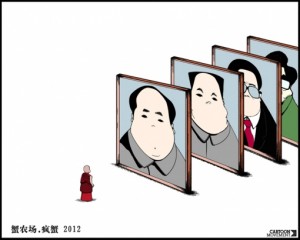In the midst of protests and government crackdowns in Tibetan areas of western China, deadly shootings were reported once again yesterday, making it the third time this week. Radio Free Asia reports on the most recent event in the ongoing conflict:
Tibetan sources in exile said at least one man was reported killed and many more were injured when police opened fire on Tibetan protesters who tried to stop them from detaining a person who had put up a poster challenging Chinese rule.
[…]Ngaba is one of several Tibetan-populated regions of western China that have been rocked in recent years by protests, including 17 self-immolations, against rule by Beijing.
The poster declared that “Tibetans will never abandon their struggle and will continue to organize more campaigns until the demands of Tibetans who have self-immolated are met,” Tsering and Yeshe said.
An article in The New York Times mentions press restrictions in the area:
Foreign journalists in Sichuan who tried to drive to the affected region were turned back at security checkpoints that had been erected more than 60 miles from where the shootings took place. One overseas activist group, Free Tibet, said its informants in Lhasa, the Tibetan capital, had reported a heavy increase in Chinese security forces there as well.
Lobsang Sangay, the Prime Minister of the Tibetan Government-in-Exile released a video to the AFP, calling on the international community to intervene on behalf of Tibetans in China.
In a recently published interview on the Houston Chronicle’s website, Lobsang Sangay spoke to the English-speaking international community about Tibetan self-immolations. He talks about what is leading Tibetans to take such drastic measures, and the Buddhist view of self-immolation as an act of protest:
Q: Why are monks and nuns self-immolating in Tibet?
A: Repressive policies of China have pushed them to the brink of desperation. Members of the Communist Party of China dictate what monks and nuns should do, how they should pray, and who should be allowed into the monasteries.
[…]
Q: Does Buddhism allow self-immolation?
A: It’s a complex issue. One could refer to Jataka tales, which concern the previous births of the Buddha. In one story, the Buddha, in a previous incarnation, gives up his body to feed a starving tigress and her four cubs. Some other stories also talk about self-sacrifice by the Buddha.
Although suicide is violent and prohibited in Buddhism, some Buddhists believe it depends on the motivation. If you do it out of hatred and anger, then it is negative. But if you do it for a pure cause … it’s such a complex theological issue. You can’t go either way or have a definitive answer. But the action is tragic, so painful.
New Tang Dynasty TV posted a video today, in which they outline a policy that will bring an abundance of CCP symbols to Tibetan populated areas. From the transcript:
January 22nd, 2012, the eve of Chinese New Year. Chinese officials in the Tibet Autonomous Region held a ceremony to unveil a portrait of four Communist leaders: Mao Zedong, Deng Xiaoping, Jiang Zemin and Hu Jintao. They go on to state that they will send these portraits, as well as Communist flags, to villages, homes, and temples in the region.
[…]In December 2011, authorities in Tibet introduced the “Nine Must-Haves” policy. It dictates nine items that all temples must display or carry portraits of Communist leaders, the Communist flag and a copy of the state-run People’s Daily.
Crazy Crab, the artist responsible for the Hexie Farm satirical cartoons, has been aiming many of his recent pieces at the situation in Tibet. His latest addition ridicules the “Nine-Must-Haves” policy:
For translations of Chinese Twitter comments about the protests in Tibet, see Oiwan Lam’s recent post for Global Voices. Also see previous coverage of Tibetan protests, via CDT.








